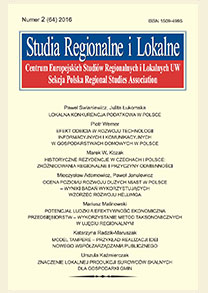Kto rządzi gminą i jak? Lokalni liderzy polityczni w teorii i praktyce samorządów w Polsce
Who Governs and How? Political Leadership in Theory and Practice of Local Governments in Poland
Author(s): Urszula Klimska, Paweł SwianiewiczSubject(s): Politics / Political Sciences
Published by: EUROREG - Uniwersytet Warszawski, Regional Studies Association - Sekcja Polska
Keywords: municipality; leadership; local government; political leader; local governance
Summary/Abstract: The article discusses political leadership in local government. Change from traditional local government to local governance requires also institutional changes and new roles played by local leaders. The notion of political leader is limited to persons having democratic legitimacy for their role played in local politics. It excludes people, who might be influential but remain outside formal democratic institutions of local government. The article distinguishes between type (which depends on formal institutional settings) and style (more dependent on personal characteristics) of leadership. The article discusses selected theoretical concepts of type and style of leadership and tries to refer them to Polish local governments. Recent Polish reforms have brought a change from the type which was close to a collective model to one closer to a strong mayor form. Analysis of four initiative in 2 Polish cities (Poznan and Ostrow Wielkopolski) allows to formulate some conclusions on citizens’ perception of actual styles of local political leadership. The largest proportion of citizens in analysed cities prefers a style which is close to consensus facilitator. But in a real behaviour of leaders, citizens see more of city boss style, which might be characterized by the implementation of an own vision with internal resources existing within local government structures. Comparison of citizens’ preferences with the perception of actual behaviour of leaders allows to compute an Expectation Gap Index. The gap is usually quite narrow in initiatives focused on the construction of broad development programmes, but it becomes wider if we turn to more concretely focused projects.
Journal: Studia Regionalne i Lokalne
- Issue Year: 4/2003
- Issue No: 14
- Page Range: 15-40
- Page Count: 26
- Language: Polish

